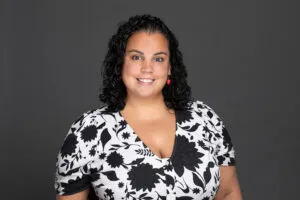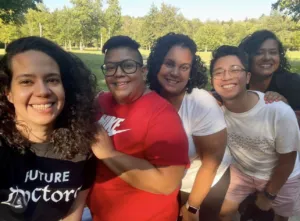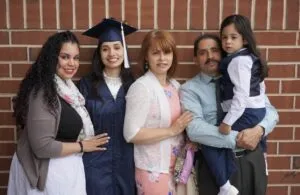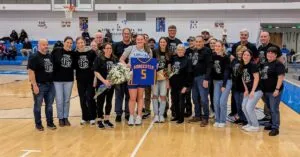Valuing Community & Identity: A Deep Dive with Melisa Alves, Director of Career Services
Worcester State’s New Director of Career Services Melisa Alves comes to us from her previous role at Fitchburg State University. As a newer member of the WSU community, Melisa shares how her leadership style was formed from her experiences as a first-generation Latinx student, how her first six months at Worcester State have gone, and the impact she hopes to make.
Melisa was originally born in New York but made her way to Worcester at age 11. She grew up in the Worcester school system, graduated from north high, and finished her bachelor’s degree at Holy cross. Melisa completed her master’s degree at Springfield college’s psychology and Counseling for Higher Education program. Currently, she is continuing her education in the doctoral program for Higher Education Leadership at UMass Boston.

Melisa Alves, Director of Career Services
Lessons in Leadership
Melisa describes her leadership style as being people-centered. “My style is very collaborative, for me, it’s important to connect with as many people on campus as possible.” Being in a new role she looks to build relationships with the WSU community to encourage new collaborations and help in the growth of her new staff. “I’m not into being the sole leader. I’m always interested in other people’s thoughts and opinions and seeing how we can work together to lead efforts on campus.” She looks forward to seeing her style transform with her new career services staff.
When recalling the lessons she has learned as a leader, Melisa stated “I think one of the biggest lessons for me and the hardest lesson for me was being a good leader is understanding that everybody has a different work style. I am a perfectionist but I think as you become a leader you have to figure out what your style is but then ask yourself how to work with others with a different working style”
“Without understanding who you are as a leader, you can do things that cause confrontation without understanding that not everyone works the same way as you do”
In working through the confrontation Melisa discussed the outcomes of understanding others’ working styles. “You have to consider how your styles merge together to get things done effectively.”
Identity Culture and Leadership Development
Melisa shared that her most salient identities guide how she does her work. Being a Latina, first-generation college student and the daughter of immigrants, and growing up in a low socioeconomic background are some that are at the forefront “Especially being a Latina is very salient because physically, you can look at me and tell that I am a Latina but for me, I am conscious of other identities of others and how to be inclusive of others values and thoughts.”
“One thing I really learned in the last five years is seeing how these identities are assets to the communities I am a part of.” She shaped these few as she saw how some of her most salient social identities can be seen by others from a lens that shapes differences as a deficit. “I have been very intentional about how I tie them into the work I do and what skills I have developed as a supervisor and leader.” Being a first-generation student made Melisa gain good research skills early on in her time in college. “Things that I needed to know I had to figure out on my own because my parents, through no fault of their own, didn’t go through the college system here.”
Melisa further spoke to the importance of navigating uncomfortable spaces that were necessary for her progression. It was a challenge as a student of a low socioeconomic background to relate to the same privileges as other students at Holy Cross. “I just learned how to be really creative with the resources I had.”

Melisa with her cohort members
A Community Centered Leader
Melisa believes a good leader should be a good listener and empathetic. “A good leader should be understanding and open, someone who is more democratic so it can really be more about working in the community.” Her identity as a Latina taught her the importance of family and community. She recognized that no matter the position, a good leader can be someone who listens to their community and is conscious of what’s happening. “You are not always going to hear what people and communities need, but you need to be attentive, so you can pick up on what your needs are in different ways.”
She feels that the community-based values connect with her leadership style and her drive to work collaboratively with others. “I come from a background where you don’t do things on your own, you work with your community, you support one another, you open your door to other people. This is how my parents raised me.”
Melisa believes one of the misconceptions of leadership is the idea that “older is wiser”. She states “No matter your age you are wise, someone older doesn’t have to be the leader of the company or the community.” This value made her recognize that every generation of leaders has its strengths. “When people think of leadership they think of people who are often older, but I learn things from my students all the time. They are younger than me but I see them as leaders too, even within the positions they hold in our office or on campus.” Through working with student organizations, she recognizes how powerful the work students do can be, if seen as leaders regardless of age or experience.
“Our students come to college with different skills and experiences gained through their different values and identities. This makes them great leaders.”
Melisa would like to change the way the traditional leader is viewed. “Unfortunately when people think of leaders they think of a very white often male-dominated space.” This misconception comes from the traditional view of often seeing white-identifying men in roles who are seen as leaders. She uses this example to remind students that just because they might be who hold certain roles at a certain time, this does not always mean they are great leaders and there is space for people of different identities to be great and effective leaders.
Experiences that Matter
When asked about her most meaningful experience working with students Melisa spoke about the relationships she has made. “I think what’s most meaningful to me is how the relationships I have built with students have carried on for many years.” Melisa started her career in higher education in 2008 and she values the students who have become friends. “Social media has made it easier to stay in touch…but try to reconnect when they are in the area.” She enjoys it when she can support former students even when she has not seen them in months or years. She spoke about the way she values seeing the growth and development of her students with what they go on to do and who they go on to be.
When asked about her accomplishments at WSU, Melisa shares she is proud of what she was able to accomplish within her first months in career services. “We have started implementing services I think are important to students and our goal is to become as visible as possible.” With a new staff Melisa is motivated to do the good work she knows the department can do and recognizes the parts of her identity and values that contribute to that drive “as the daughter of immigrants, my parents are some of the most hard-working people I know. I feel like that’s what I do, I go into institutions and I work really hard to do what needs to be done, and I do it for the students.” Her drive is to make sure career services can get Worcester State students what they need for success.

Meilsa with family members
Melisa shared her advice to student leaders to “take time to pause and reflect”. Taking this time in undergrad to pause and think was something her institution valued when she was a student. She recalls how this made a significant impact on her leadership style. “I was able to pause and think about who I was, how my identity tied into the work I was doing, what was purposeful to me, what I find joy in, and who I wanted to be as a leader. This helped me develop so much in my four years in undergrad.” She goes on to recommend that students take this time for themselves to understand more of what they want to get out of being a leader and how identity can play a role in finding your leadership style and have an appreciation for those identities and how they can support what you bring to the table.
To connect further with Melisa and see what career services have to offer, visit worcester.edu/career-services.



